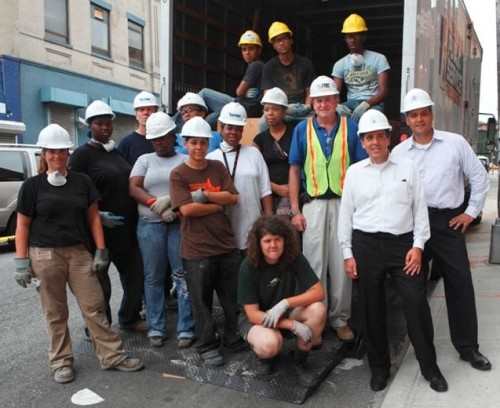Columbia Partners with Local Groups to Create Green Job Opportunities
Environmental salvage project employed 40, taught valuable skills

NEW YORK, August 10, 2009 - As part of its continuing commitment to environmental sustainability and to providing employment opportunities to its neighbors, Columbia University hosted a "green" salvage and reuse on-the-job training program this summer in Harlem.
Utilizing about 40 men and women from two local job training and placement programs, Columbia began the process of carefully deconstructing a university building on West 125th Street called Reality House. Approximately 40 tons of surplus materials - office and classroom furniture, file cabinets, electronic equipment, lighting fixtures, scrap metal and wood - was removed. Ninety percent of the materials were suitable for recycling and were donated both locally and internationally.
"This project enhances the university's commitment to environmental sustainability while reusing materials and creating green job opportunities within our community," said Joe Ienuso, Columbia's executive vice president for facilities. "We hope to emulate the success of these types of win-win projects in the future."
Job opportunities requiring skills taught on this project - salvage, reuse and surplus management -- are growing. The Reality House project provided an ideal training site for both of the local training programs. One of the programs was Nontraditional Employment for Women, a non-profit organization that trains women for jobs in the construction trades, with a major focus on green construction practices. The other was the School of Cooperative Technical Education, which provides job training to at-risk young men and women in Upper Manhattan.
The month-long salvage project was managed by the Institution Recycling Network. It specializes in construction-site recycling and planned reuse of surplus office and classroom furniture, and works to ensure that all materials are recycled or discarded in compliance with state and federal waste and privacy regulations. In the past, Columbia worked with the network during renovation projects in residence halls and at Faculty House, the university's premier event venue.
The network partnered with Build It Green! NYC, the city's largest building materials reuse center, which received approximately eight tons of building materials and furniture. As a direct result of the success of the project at Reality House, the network is hiring a crew of workers from Nontraditional Employment for Women for an upcoming project on Governor's Island.
"This project had it all - from green job training and building materials reuse in the community, to recycling and surplus materials shipped to countries in need such as such as Haiti and Nicaragua," said Mark Lennon of the Institution Recycling Network. "I've seen a lot of recycling projects, but not a single one with so many winners."
Columbia University has a longstanding history of community service and engagement. Public service and hands-on involvement in local, national and global communities is an essential part of both academic and professional life at the university. Columbia students, faculty and staff work together and individually to address environmental and social challenges, as well as the needs of underserved communities in a range of areas, including health care and education.
Each year, students from Columbia's School of Social Work conduct more than 245,000 hours of field work at some 300 sites around New York. Similarly, Columbia's Community Impact provides a dedicated corps of more than 950 student volunteers to participate in 25 service programs serving more than 8,000 people each year. Through local partnerships and service programs, employment opportunities and economic impact, basic and applied research, intellectual and cultural contributions, Columbia and New York are woven together into the fabric of academic and urban life.
(Editor's note: On Friday, August 7, Columbia hosted a small reception to thank workers from Nontraditional Employment for Women and the School of Cooperative Technical Education for their participation during the Reality House project. Photos taken during the reception are available for news media use on request.)